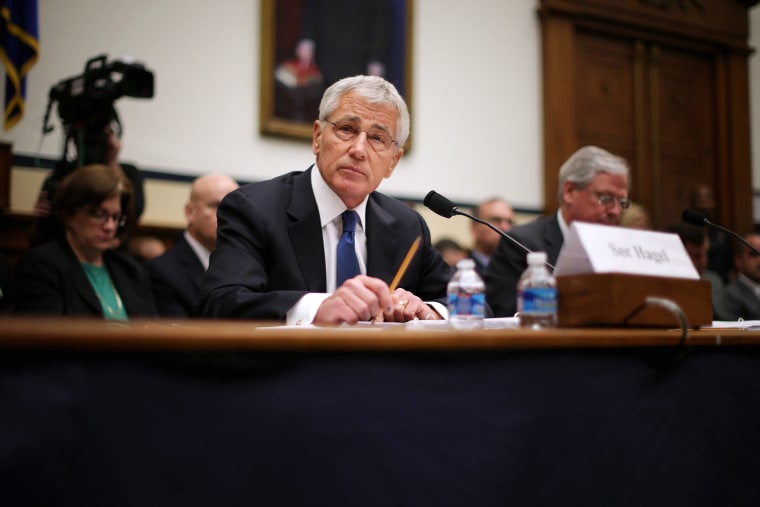Circumstances surrounding the swap of five senior Taliban detainees from Guantanamo Bay in exchange for Sgt. Bowe Bergdahl were “extraordinary,” Defense Secretary Chuck Hagel told lawmakers Wednesday, and merited the lack of communication with Congress, for which President Obama is currently facing mass criticism.
“I recognize that the speed with which we moved in this case has caused great frustration, legitimate questions, and concern,” said Hagel before members of the House Armed Services Committee. Wednesday’s hearing marked the first public testimony from an Obama administration official about the exchange.
“We could have done a better job -- could have done a better job of keeping you informed,” Hagel added. “But I urge you to remember two things. This was an extraordinary situation. First, we weren’t certain that we would transfer those detainees out of Guantanamo until we had Sgt. Bergdahl in hand. And second, we had Sgt. Bergdahl in hand only a few hours after making the final arrangements.”
Hagel carefully laid out the narrow time frame leading up to the deal, explaining that its mechanics were only agreed to four days before the exchange, at which point Obama made the final call to proceed. Officials learned of the general area for the handoff one day in advance, Hagel said, and were given the precise location only an hour before.
Complicating matters further, Hagel explained, Qatari intermediaries warned them that “a leak -- any kind of leak -- would end the negotiations for Bergdahl’s release.”
“We received a warning from the Qatari intermediaries that as we proceeded, time was not on our side,” Hagel said. “This indicated that the risks to Sgt. Bergdahl’s safety were growing.”
Bergdahl, an Idaho native and the only U.S. soldier held captive in Afghanistan, had been a prisoner for five years. Almost as controversial as the circumstances surrounding his release, however, have been those surrounding his 2009 capture. Many have labeled him a “deserter,” as questions over his mental state continue to swirl.
Before he became a Taliban prisoner, Bergdahl was discharged from the U.S. Coast Guard for psychological reasons and exhibited emotional struggles, according toThe Washington Post. The U.S. Army is currently investigating Bergdahl’s decision to leave his military post, which ultimately landed him in Taliban captivity.
But on Wednesday, Hagel came to Bergdahl's defense.
“Like any American, Sgt. Bergdahl has rights, and his conduct will be judged on facts – not political hear-say, posturing, charges, or innuendo,” said the defense secretary. “I’ve been offended and disappointed in how the Bergdahl family has been treated by some people. No family deserves this. I hope there will be sober reflection on people’s conduct regarding this issue and how it relates to the Bergdahl family.”
Republican Rep. Jeff Miller of Florida pressed Hagel in one of the day’s most heated exchanges on why the Pentagon had yet to bring Bergdahl back to the U.S. for questioning. Since his release, Bergdahl has been kept at the Landstuhl Regional Medical Center in Germany.
“You’re trying to tell me that he’s being held at Landstuhl because of his medical condition?” asked an incredulous Miller, seeming to suggest that the Obama administration was shielding Bergdahl’s past so as not to make it known that they took extraordinary steps in bringing home a deserter.
“I don’t like the implication of the question,” said Hagel, over repeated demands from Miller that he answer. “He’s being held there because our medical professionals don’t believe he’s ready … This isn’t just about a physical situation, congressman. This guy was held for almost five years in God knows what kind of conditions.”
"If any of these detainees ever try to rejoin the fight,” said Hagel, “they would be doing so at their own peril."
Permeating Wednesday’s proceedings were questions over why lawmakers had been left out of the loop. Committee Chair Rep. Buck McKeon, R-Calif., said there was “no compelling reason why the administration could not provide a notification to Congress 30 days before transfer,” in compliance with the National Defense Authorization Act. Later in the hearing, Republican Rep. John Kline, of Minnesota, called the department’s rationale for excluding Congress “torturous.”
“Yes there was confusion,” admitted Hagel. “This was imperfect, imprecise … But through that, we had to remain focused on what the objective was, and that was getting an American POW back, with the reassurances that we needed to be able to say it would substantially mitigate the risks and it was in the interests of our country. That was the objective, and that’s what we tried to do.”
“I know there are differences, I know there are questions, and I get it,” he said. “But we did get him back. And we don’t have any more POWs.”
